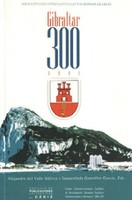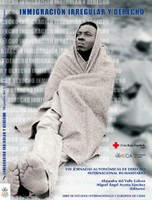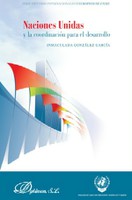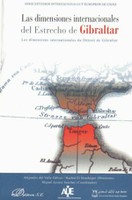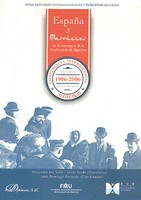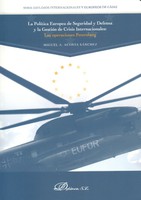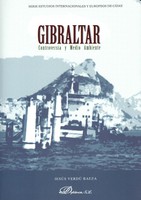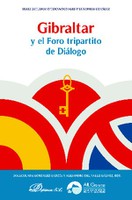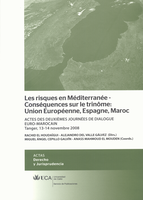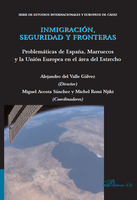Series of International and European Studies of Cadiz

In this section you will find information about the books published in Series of International and European Studies of Cadiz, which began in 2004.
Authors: Alejandro del Valle Gálvez e Inmaculada González García (Eds.)
Publishing House: Servicio de Publicaciones de la Universidad de Cádiz.
Year of Publication: 2004
Information about this book in DIALNET.
GIBRALTAR, 300 YEARS is a collective work whose title expresses the memory of the 300 years since a tragic event. It had all kinds of consequences, including the controversy which Spanish and British generations have experienced. A work that conceives from the present and looks hopefully to the future of the multifaceted reality of Gibraltar, symbol and inexhaustible source of problems and cooperation, is reminiscent of feelings and its prospects of solution are always open and people keep rethinking its problem (negotiations about co-sovereignty in 2001-2002), new tripartite forum for dialogue since 2004).
The book is mostly the result of the courses organized by the University of Cadiz and the City of San Roque in the editions of 2002 (Gibraltar: towards the end of the controversy?), 2003 (neighborly relations between Gibraltar and the Campo de Gibraltar) and 2004 (Gibraltar 300 years, present and future). The book offers different analyzes and views of the best specialists and experts in the subject of Gibraltar, as well as the main actors and representatives of Gibraltar and the Campo de Gibraltar.
The work, which includes the many prospects for solving the problem, covers many issues connected with the controversy, sovereignty, the status of Gibraltar, neighborly relations and Cross-Border Cooperation. It also contains plans about the institutional, social and cultural relations between Gibraltar and the Campo de Gibraltar. A final section summarizes the main texts, documents and maps of Gibraltar.
The book’s cover symbolizes intertwined coexistence of people during 300 years and contains the emblem of Gibraltar, which is also the emblem of San Roque.
Inmigración irregular y Derecho
VIII Jornadas Autonómicas de Derecho Internacional Humanitario
Authors: Alejandro del Valle Gálvez y Miguel Acosta Sánchez (Eds.).
Publishing House: Servicio de Publicaciones de la Universidad de Cádiz.
Year of publication: 2005
Information about this book in DIALNET.
Illegal immigration is one of the biggest challenges that Andalusia has faced in recent years. In effect, it highlights the urgent need to establish and develop social instruments, humanitarian and essential materials to address the diverse issues involved in this human avalanche, deeply motivated by inequality fractures traversing the planet. Similarly, the phenomenon of illegal immigration makes clear the urgent need for better regulation of these issues in international, European and Spanish area. Undoubtedly, the issue of illegal immigration is one of the most important topics that citizens worry about. This problem is intensified in the province of Cadiz, traditional gateway to the West of the people who look for a “future”, or simply survive.
For many years, Spanish Red Cross has provided their generous assistance to give minimal humane treatment for all immigrants who came to the Andalusian coast, regardless of compliance with the requirements of regularity in their entry. The Red Cross initiative to organize a conference about irregular immigration law was immediately welcomed by the University of Cadiz, sensitive institution to the human drama that the province experiences every day. The VIII CONFERENCE ABOUT INTERNATIONAL HUMANITARIAN LAW, which aim was to solve the problem of IRREGULAR IMMIGRATION AND LAW, was held on 19 and 20 February of 2004 in Cadiz. The organization of these conferences was provided by Red Cross-Cadiz, University of Cadiz, specifically the Directorate of Logistics and Solidarity and the Department of Public International Law, Faculty of Law.
This book contains the lectures and communications that were presented at the conference. This conference and the subsequent work that the reader has in their hands have been divided into four main sections, which deal with what we understand as the main topics of interest from a legal standpoint and humanitarian law: the entrance, the border service, permanence and legal status of illegal immigrants. There should be welcomed collaboration conducted between the University of Cadiz and Spanish Red Cross. And in particular, we should recognize the great activity of the General Directorate for Solidarity of the UCA, as well as Red Cross-Cadiz. Without the enthusiasm and total dedication to these issues of their staff and colleagues it wouldn’t have been possible to present this book.
Naciones Unidas y la coordinación para el desarrollo
Author: Inmaculada González García
Publishing House: Dykinson
Year of publication: 2005
Informatión sobre este libro en DIALNET
NACIONES UNIDAS Y LA COORDINACIÓN PARA EL DESARROLLO covers one of the most problematic issues of the International Society of our time: how to articulate coherent institutional and economic means to combat underdevelopment, which is the deepest fracture that divides the people of the planet. The United Nations now is the only global forum which carries out a cooperation for development. To a large extent, this performance will depend on the legitimacy of the United Nations system, a system designed for too long.
The book examines the status and evolution of the various institutional, legal and political coordination within the United Nations (ECOSOC, programs, agencies, operational activities, world conferences …) on development cooperation, thematic common transverse to the UN and the specialized agencies of the system (FAO, UNIDO …).
The real, practical importance of this problem is underscored by the author, who reveals the political, institutional and legal ineffectiveness of a coordination model with poor structure. The book is a critical contribution to theoretical and practical knowledge of the operation and failures of the United Nations system, in its action on Cooperation for development.
Las dimensiones internacionales del Estrecho de Gibraltar. Les dimensions internationales du Detroit du Gibraltar
Authors: Alejandro del Valle Gálvez y Rachid El Houdaïgui (Directores); Miguel Acosta Sánchez (Coordinador)
Publishing House: Dykinson
Year of publication: 2006
Information about this book in DIALNET
EThis book is a result of the reports presented at the First conference of Euro-Moroccan dialogue organized by the Aula Universitaria of the Strait at the Faculty of Law, Economics and Social science of Tangier, in order to discuss common issues for both sides. This area, full of questions of International Law and International Relations, produces many issues which are covered by teachers and Andalusian and Moroccan diplomats. The work is divided in the sections: “The challenges of security in the Strait of Gibraltar”, “The Strait, the gateway for a transnational relationship in the areas of immigration, human rights and economic cooperation”, “The law of the sea and the protection of the marine environment in the Straits”, “Rhe Strait of Gibraltar and the new global challenges “. Also this book tries to solve various issues and international perspectives which are known to both sides of the Strait. Hence its French title, Les dimensions internationales du Detroit de Gibraltar and its intention to hear the other with respect, understanding and closeness.
España y Marruecos en el centenario de la Conferencia de Algeciras
Authors: Alejandro del Valle Gálvez y Jesús Verdú Baeza (Directors); Juan Domingo Torrejón Rodríguez (Coordinator)
Publishing Hous: Dykinson
Year of Publication: 2006
Information about thiw book in DIALNET
A hundred years ago the European authorities were called to Algeciras to decide the future of the Sultanate of Morocco, last territory that was outside European expansion in the African continent. Morocco became the center of the U.S. imperial purposes, with Spain deeply shaken by the crisis of ninety-eight. Besides, Africa didn’t have common policy and suffered a sharp declining phase in its external position. The centenary of this event is presented as an appropriate occasion to promote the study, reflection and discussion of the complex relations between Spain and Morocco, which were very significantly marked and burdened by the results of the Diplomatic Conference. The collective work is fruit of the reports presented during 2005 and 2006 in the International Courses of the University of Cadiz and Algeciras, with support of the Aula Universitaria del Estrecho. The work offers a balance between the purely academic approaches and derivatives of international experience and political practice with participation of diplomats, professors and university researchers. In times of great uncertainty of the beginning of the XXI century in relations between nations and states of different cultures, traditions and religions, this work is a contribution to a better understanding of the relations between Spain and Morocco, extraordinarily complex and dependent on its geographical location for both sides of the Straits of Gibraltar. But in the end, these states have common values that derive from its long shared history.
La Política Europea de Seguridad y Defensa y la Gestión de Crisis Internacionales. Las operaciones Petersberg
Author: Miguel Acosta Sánchez.
Publishing House: Dykinson.
Year of publication: 2008.
Information about this book in DIALNET.
The dramatic changes in the conception of security in the post-9/11 period and downsizing of military International Organizations such as the WEU and NATO in the current international situation, also affect the European Union, where security and Defense constitute a certain reality in the attempt to articulate a Common Foreign and Security Policy (CFSP). Among the important developments of this Policy, the military activity of Europe in crisis management operations worldwide, by means of Petersberg Tasks, assumed by the Treaty on European Union in1997, to carry out humanitarian and rescue missions, crisis management, prevent conflicts and keep peace.
This book examines the actual autonomous capacity of Europe to manage and prevent international crisis with military and civilian units that constitute effective European multinational peacekeeping forces. In particular we analyze the birth and development of Petersberg Tasks, its institutional, regulatory, financial and material resources, gauging their suitability to allow the EU to work consistently in emergencies. It gives the specific study of the successive military operations in the Democratic Republic of the Congo, Macedonia and Bosnia-Herzegovina together with European practice of civilian crisis management by police missions deployed in the republics of the former Yugoslavia. The author presents a series of assessments and proposals for improvement in order to provide overall operability of the EU’s external action in the area of peacekeeping and security, potential future developments pointing towards greater presence of the EU on the international scene.
Petersberg Tasks are excellent example of the progressive European capacity for intervention in international conflicts, and therefore the actual efficiency of the European Security Policy and Defense. In effect, activity of the multinational forces under blue flag is the proof of the consolidation of the CFSP and the European Union that plays an essential part in peacekeeping which is an important aspect of democratic values in Europe and the rule of law in International Society.
Gibraltar. Controversia y Medio Ambiente
Author: Jesús Verdú Baeza.
Publishing House: Dykinson.
Year of publication: 2008.
Information about this book in DIALNET.
The Bay of Algeciras and its surroundings have an extraordinary environmental value but it is a constant subject to environmental impacts. The continual presence of oil spills in its waters causes deterioration of the environment that can have a greater impact on marine ecosystems. Spills do not come, in most cases, of oil tanker accidents, but actions such as washing tanks, bilge water spill and fuel supply operations. This work aims to analyze the reasons of the existence of such spills, a circumstance which is added to other environmental degradation factors such as the existence of risks (constant existence of nuclear submarines based in Gibraltar).
The conquest of Gibraltar by the British and the Dutch squadron on August 4, 1704 and the legal transfer of the territory by the Treaty of Utrecht in 1713 caused a profound transformation of the natural environment of the bay and became a reason of a process of degradation of the environment and living conditions of the area which lasts until today but still it didn’t have a specific character under bilateral negotiations between Spain and Britain. In this sense, two or three administrations, if we consider the administration of Gibraltar had in common the lack of a clear and strong focus on implementation and enforcement in the prevention of environmental damage which should be the main problem in cross-border relations as it has become one of the guiding principles of neighborhood relations in contemporary international law.
The book reveals that the Gibraltar dispute in addition to many political, legal and diplomatic problems raises a number of environmental conflicts affecting relations between two territories which aggravates the disputes. The truth is that the environmental problems cause a deep degradation and an undeniable impact on the quality of life of people in the area.
Política comercial europea y preferencias arancelarias
Author: Miguel Ángel Cepillo Galvín.
Publishing House: Dykinson.
Year of publication: 2008.
Information about this book in DIALNET.
The study of different aspects of EU external action is always important because of the essential role it plays in the international scene. In the conditions of globalization where EU is one of the most important actors, it is ready to become a leader. Within this external action of European Union Common Commercial politics is the most important.
The book is concentrated on analysis of legal presentation of the European commercial politics by means of detailed study of Generalized System of Preference. Through this system, the EU has preferential tariff treatment in developing countries. This treatment consists of reduction or even elimination of customs tariffs for industrial products from developing countries, and partially for agricultural products. It aims at increasing the participation of the developing countries in the world trade and improving their economic development.
This book reveals the existence of perspectives of EU in the action and adaption of external commerce acts like in case of Generalized System of Preference. The study of Generalized System of Preference helps to investigate different dimensions, not only commercial, of European commercial politics. Also the book describes how the system changes and adapts to the needs of European Union being the world leader, particularly in its Political and Economic relations with the developing countries.
Gibraltar y el Foro Tripartito de Diálogo
Authors: Inmaculada González García y Alejandro del Valle Gálvez (Eds.).
Publishing House: Dykinson.
Year of publication: 2009.
Information about this book in DIALNET.
This book is the first work that examines the Tripartite Forum on Dialogue in 2004 about Gibraltar and important changes achieved after it. This Forum between the United Kingdom, Spain and the Government of Gibraltar has established frames of cross-border cooperation between Gibraltar and Campo de Gibraltar. The historic controversy between Spain and Britain about the colony was the base of this forum.
The book analyses the activities of the Forum and evaluate its dynamics, importance and perspectives on the future. The most important agreement achieves in the Forum are Cordoba Agreements of 2006 about pensions, crossing the borders of the isthmus and use of airport. Another problems discussed on the Forum were environmental problems, maritime safety, education and financial services. Academicians, diplomats and politicians of Spain and Gibraltar who participated in the Autumn Courses by University of Cadiz in Algeciras in 2007-2008 («Los acuerdos de Córdoba sobre Gibraltar, ¿un paso adecuado en la resolución de la controversia?»; «Gibraltar – Campo de Gibraltar y el Foro de Diálogo: relaciones actuales y perspectivas»), collaborated on the book.
The book emphasizes the importance of the Tripartite Forum for existing neighborhood relations between Britain, Gibraltar and Spain and reflects the reality of united institutions in the foreign policy of Spain, suitable for a problem the controversy. Government initiative of cross-border cooperation helped to solve the urgent problems of agreements and treaties, beneficial for populations of Gibraltar and Algeciras Bay. The Tripartite Forum allows Spain to focus immediately on the problems with Gibraltar and the United Kingdom and constant historic controversy. To sum it up, the Tripartite Forum shows that the political initiative and willingness to cooperate can remove taboos in a short time and solve problems of citizens and populations, who suffered from the scars of history.
Les risques en Méditerranee – Conséquences sur le trinôme Union Européenne, Espagne, Maroc.
Actes des Deuxièmes Journées de Dialogue Euro-Marocain. Tanger, 13-14 novembre 2008
Authors: Rachid El Houdaïgui, Alejandro del Valle Gálvez (Dirs.); Miguel Ángel Cepillo Galvín, Anass Mahmoud El Mouden (Coords.).
Publishing House: Servicio de Publicaciones de la Universidad de Cádiz.
Year of Publication: 2010.
Information about this book on DIALNET.
Throughout history, the Mediterranean region has become a crossroads, which combine different networks of relations, involving several actors from all sides of the Mediterranean: from the Euro-Mediterranean partnership to bilateral relations between the countries of the region. Thus, this region has become an important center of cooperation, but also a source of many risks.
This collective work, written in French (except the epilogue), examines the interventions of the Second Conference of Euro-Moroccan dialogue, held in Tangier in November 2008, under the Interuniversity Cooperation Project (ICP) ‘Politics of risk evaluation in the area of the Strait of Gibraltar – border, environmental and economic risks”(A/012559/07), between the Universities of Cadiz and Abdelmalek Essaâdi Tangier-Tetouan.
As proof of the existence of significant trans-university cooperative ties, this book has teachers and university researchers in International Law and International Relations, from both sides of Straits of Gibraltar, who have the ambition to share their analyzes, and reflections, about of the various risks affecting the protagonists of relations in the Mediterranean region.
Analyzed, thus, three kinds of risks. First, the international security risks linked to cross-border organized crime and international terrorism, and the responses offered by the EU, NATO and through bilateral cooperation between Mediterranean countries. Second, we analyze the risks associated with illegal immigration, emphasizing the need for better development cooperation as a way to solve migration “problems”. Third, we analyze the environmental risks as well as those arising from regulatory gaps in the Law of the Sea from the Mediterranean coastal States.
This shared analysis is not limited to the risks, but proposed solutions and alternative ways to manage it, insisting that it is necessary the development of those countries that are disadvantaged, and supporting the cooperation as a way to overcome all differences.
Inmigración, seguridad y fronteras. Problemáticas de España, Marruecos y la Unión Europea en el área del Estrecho
Authors: Alejandro del Valle Gálvez (Dir.); Miguel Acosta Sánchez y Michel Remi Njiki (Coords.)
Publishing House: Dykinson.
Year of publication: 2012.
Information about this book on DIALNET.
The Gibraltar Strait area is certainly a very interesting place for analysts and academics, as here converge various problems linked to this border area in particular, and that derived from their status as strategic seaway, splitting continents apart and cooperation between states and cultures. For Spain in particular is where boundaries are located and discussed controversies such as Gibraltar and territories claimed by Morocco, as the Cities, Islands and Rocks of Spain in Northern Africa. Especially, the Gibraltar Strait area is essential for Spain’s relations with Morocco, and place very special paradigm of EU relations with Morocco.
The book contains studies and papers presented by several authors in the Conferences and courses promoted by the Jean Monnet Department “Migration and Borders’ of EU law. These reports, studies are related to two fields of problems: the Immigration in Spain and the European Union on the one hand and, on the other hand, international and cross-border cooperation with Morocco. The book, therefore, deals with the issues and problems of immigration and borders in Spain and the European Union. But also it covers the different problems in the area of the Strait, in fields connected with immigration, security and development, and in particular economic issues, legal and social issues raised by the European politics of Security, Commercial and Foreign Cooperation or Immigration with Morocco.
In sum, this work presents a content as varied as necessary, processing and analysis in order to know the reality and the problems it poses for Morocco, Spain and the European Union promoting cooperation on immigration, border security and in this area as special as the Straits of Gibraltar.


